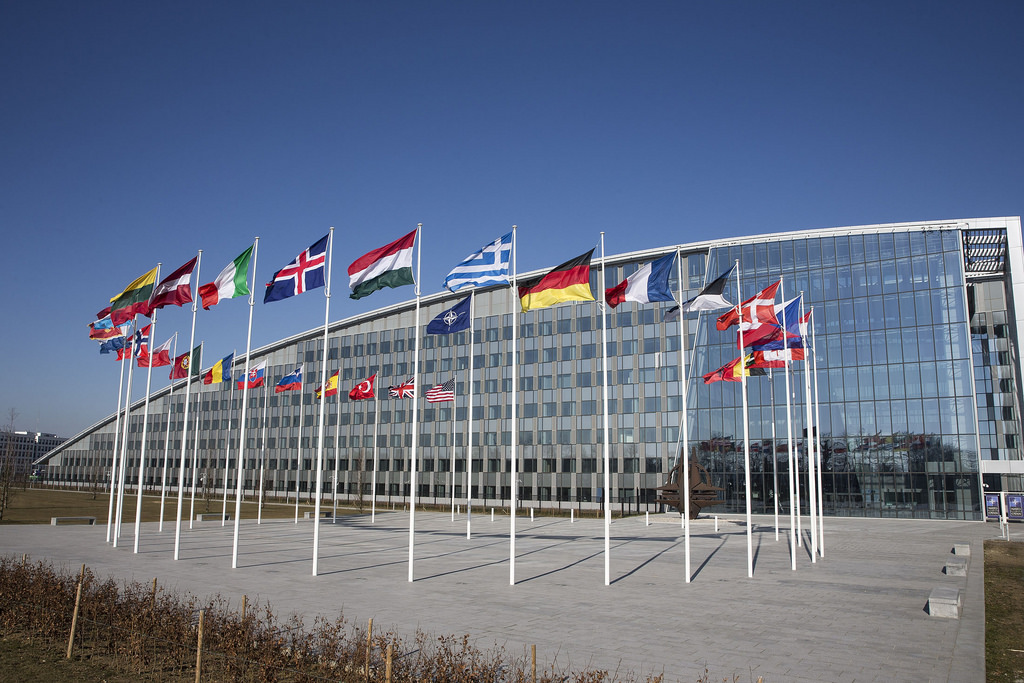A Stronger European Defense Requires Resetting Cooperation Between the U.K. and Europe
The U.K.’s “refresh” of its defense and security policy in the coming weeks provides an oppo

Russia’s war against Ukraine has triggered a “Zeitenwende”—or sea change—not just in Germany, but across Europe. Since last February, European countries have put aside their many strategic differences to step up on defense and forge a united front in support of Ukraine.
After years of introspection over the role it would play in Europe after leaving the European Union (EU) and fraught relations with some EU member states, the United Kingdom has been instrumental in Europe’s response to the war. The U.K. is the second-largest donor to Ukraine behind the United States, it has intensified its efforts within NATO, and it has used new military cooperation formats such as the Joint Expeditionary Force to strengthen ties with some European partners.
This moment presents an opportunity to reset the security and defense relationship between the U.K. and Europe after the torrid Brexit years. The past year has shown that, even though the U.K. has left the EU, it is still at the heart of European security. The U.K. and Europe should recognize this reality and reexamine their relationship. One timely opportunity to do this is the U.K.’s “refresh” of its 2021 Integrated Review, which is due to be published in the spring. The refresh offers a good opportunity to chart a new course for U.K.-Europe defense and security relations—but both sides must follow it together.
A More Stable Footing
Since 2016, London and Brussels have been playing a zero-sum game of conflicting imperatives, with successive U.K. governments determined to “get Brexit done” and continental Europeans set to prove that leaving the EU has a cost.
This tension proved detrimental for the coordination of foreign and security policy. The most prominent example was the launch of the AUKUS partnership and the EU’s Indo-Pacific strategy within hours of each other in September 2021. The security pact among Australia, the U.K., and the U.S. was knitted in secrecy and announced without prior notice to Brussels and key European capitals. The move infuriated Paris, whose interests were directly affected as the agreement scrapped a preexisting deal between France and Australia to build submarines. This in turn undermined the prospects of a mutually reinforcing European approach to engaging in the Indo-Pacific and confronting China. Not to mention the damage done by the AUKUS announcement to the relationship between the U.K. and France, Europe’s most important defense partnership.
The uncertainty over the U.K.’s post-Brexit role in European security was reflected in key strategic documents published by each. For example, the EU’s Strategic Compass—the Union’s road map for defense and security over the next decade—simply states: “We remain open to engage with the United Kingdom on security and defence.”
For its part, the U.K.’s own 2021 Integrated Review—the government’s review of defense and foreign policy that it conducts every 4-5 years—committed on paper to find “new ways of working with [the EU] on shared challenges.” Yet these ways have failed to emerge in practice, with the British government preferring a “flexible, ad hoc approach” to any formal agreement for cooperation on defense and security with the EU. The Integrated Review was judged at the time to contain a “Europe-sized gap”—an assessment that has been replicated in recent weeks in two reports by the U.K. Parliament’s own Foreign Affairs Committee and House of Lords International Relations and Defence Committee.
Now, the magnitude of shared challenges—not least the war in Ukraine, but also the broader challenge of transforming European defense after years of neglect and underinvestment—requires this gap to be filled.
Since the war broke out, the U.K. and its European partners have found ways to work together. They have managed to coordinate their approaches even on complex issues like sanctions, where a joint European response was forged with the help of U.S. leadership through bespoke groups such as the transatlantic task force. They have also coordinated their significant military assistance to Ukraine through various bespoke forums, including the U.S.-led Ukraine Defense Contact Group and the U.K.-led Joint Expeditionary Force leaders meetings.
This is encouraging, but Europe will not always be able to muddle through and rely on Washington’s political and military leadership in future crises. The successes of the past year mask the ad hoc nature of defense and security relations between the U.K. and Europe. London, EU capitals, and Brussels should leverage the current momentum to reset the relationship and put it on a more stable footing, using bilateral, minilateral, and institutional forums.
Start with the “Détente Cordiale”
The U.K.-France bilateral relationship combines the two most advanced militaries in Europe—and the continent’s only two nuclear powers. Their cooperation is crucial to advance European defense efforts. But since Brexit, the “entente cordiale” has seen new lows, with public quarrels between London and Paris over border management, fishing rights, and AUKUS. They should make 2023 the year of the “détente cordiale.”
A planned bilateral summit on March 10 hosted by the Elysée offers an opportunity to resuscitate the “Saint-Malo spirit” of the 1998 declaration signed by Tony Blair and Jacques Chirac that laid the foundations for a common European defense policy. Specifically, the talks are a chance to revive the bilateral cooperation in security and defense, framed by the 2010 Lancaster House Treaties, whose implementation has stalled. The summit will likely revolve around capability cooperation, rejuvenating the Combined Joint Expeditionary Force and support to Ukraine.
The two countries could also use the talks to initiate a broader reflection on how Europeans can step up as security providers in the Middle East and Africa at a time when the U.S. is drawing down its presence in Europe’s southern neighborhood. And London and Paris should reconcile and coordinate their agendas in the Indo-Pacific. The region is a shared priority for both capitals, as shown by the U.K.’s “tilt” to the Indo-Pacific and the French Indo-Pacific strategy, which highlights the imperative to secure its overseas territories in the Indian Ocean and in the South Pacific.
The U.K. as a Connector
Britain should leverage its strong bilateral relationships to facilitate new multilateral cooperation formats among like-minded small groups of nations. Doing so would live up to the U.K. government’s “Network of Liberty” foreign policy vision.
The U.K. has strong relations and vital interests in the Arctic, Nordic, and Baltic regions. The centerpiece of this thrust is the U.K.-led Joint Expeditionary Force of 10 “amphibian, beer drinking nations of northern Europe,” which London has developed into an active and versatile format over the past decade. The U.K. can play an important role integrating Finland and Sweden into NATO, given that its security assurances helped pave the way for their applications.
The U.K. also has robust working relationships with capitals in Europe’s east and north, which it could channel to facilitate new European leadership dynamics. These frontline countries often resent their relative lack of influence in Europe, and considering the sputtering Franco-German engine, Paris and Berlin, too, could benefit if the U.K. helped build bridges in the north and east. London’s good relations with Warsaw are particularly relevant in this context, given the parlous state of the relationship between Germany and Poland and the stranded “Weimar format” between Poland, Germany, and France. In addition, using the “European 3 format,” which was used effectively to coordinate positions on Iranian nuclear negotiations, could enable more regular and formalized cooperation among Europe’s three biggest capitals. Finally, at a broader level, London will have the opportunity to display and spell out its ambition for Europe as a whole at the fourth summit of the 44-nation European Political Community in early 2024, which the U.K. has offered to host.
Putting Institutions First
London must balance and coordinate bilateral and minilateral efforts with the primary security institutions of Europe: NATO and the European Union.
As a founding member of the Atlantic Alliance, the U.K. has always had NATO as a cornerstone of its defense. In recent years, British leaders have made a concerted effort to put “NATO at the heart of the U.K.’s defence policy,” with enhanced efforts to reinforce Estonia offering a recent example. Since leaving the EU, Britain has been one of the strongest advocates for NATO initiatives on resilience, hybrid threats, emerging and disruptive technologies, and innovation.
Yet, given the EU already has capacity and competence in these areas, many member states—France being the most vocal—have warned against duplication. The recent EU-NATO Task Force for Resilient Critical Infrastructure is a welcome initiative that will hopefully build convergence on a key shared concern, but tensions remain.
The U.K. can show leadership and gain trust by making NATO-EU cooperation a priority. Working jointly on technology innovation is a good example. NATO’s new Defence Innovation Accelerator for the North Atlantic, known as DIANA, provides a mechanism, along with $1 billion of funding announced at the latest NATO summit in Madrid, to encourage innovation and cooperation on European technology. DIANA is jointly led by the U.K. and Estonia, which shows how strong bilateral relations can translate into institutional leadership. However, given the EU has traditionally been the focal point for European technology and innovation—using its common budget to incentivize research and development efforts, and regulatory tools to integrate European markets—this will need careful coordination and deconfliction.
Broader EU efforts to reinforce the European defense industrial and technical base also require policymakers in Brussels and London to explore the contribution of U.K. firms to these efforts. As Europe rearms to face a revanchist Russia, it must foster an integrated defense industrial base across Europe.
Most European countries have increased their defense spending to refill urgent defense capability gaps resulting from years of underspending and arms transfers to Ukraine. But European defense firms are struggling to ramp up production capacity after years of operating at minimum rate. The European defense industrial base has always been a fragmented landscape, with low levels of cooperation and high dependencies on third-country suppliers (especially the U.S.). To avoid cementing this fragmentation in the rush for new arms, the EU is implementing a range of incentives for member states to develop, produce, and procure together. These initiatives should include U.K. defense firms. The new agreement for the U.K. to participate in its first Permanent Structured Cooperation project on military mobility shows the possibility of U.K.-EU pragmatic cooperation on areas of common defense industrial interest.
Another domain of potential fruitful cooperation between the EU and the U.K. is maritime security. The EU’s new Coordinated Maritime Presences concept seeks to bolster freedom of navigation, the freedom of maritime security routes, and global economic development through permanent, coordinated presence in key strategic areas such as the Gulf of Guinea and the Northern Indian Ocean. These efforts would benefit from increased coordination with the U.K., which has an active maritime presence there and important maritime domain awareness tools.
An Integrated Approach to European Defense
The U.K. government is currently working on a refresh of its 2021 Integrated Review ahead of its spring budget statement on March 15. This refresh gives the U.K. a timely opportunity to set out a new approach. As the government has already signposted, the update “will set out the importance of building strong ties in Europe in the era after the UK’s departure from the EU.”
A formal defense and security arrangement between the U.K. and EU remains desirable. Such an agreement could help socialize any incoming governments into a consistent and predictable relationship, rather than returning to square one every time. This would exert a disciplining effect on both sides: Even if muddling through has worked so far, it guarantees nothing in the future.
The U.K.’s governing Conservative Party is unlikely to reverse its policy on this issue. But any future Labour government would. As Shadow Defence Secretary John Healey put it in a speech in early February: “Labour will seek a defence and security pact with the EU, and new defence agreements with leading European allies like Germany.” The current government should take the chance to shape this political terrain before it is shaped for them.
Rishi Sunak’s election as U.K. prime minister and his apparent eagerness to open a new page with Brussels and other European capitals provides an opportunity to reset security and defense cooperation between the U.K. and Europe. The momentum-building toward a shared solution to the Northern Ireland Protocol—which has been one of the most difficult issues to solve since Brexit—could spill over into other areas. The refresh of the U.K.’s 2021 Integrated Review provides a timely vehicle to set out a new approach based on bilateral, multilateral, and institutional pillars.
Necessity is the mother of all invention. The war in Ukraine has forced the U.K. and Europe to find ways of cooperating through ad hoc formats. But doing things out of necessity is not the same as doing them well. Now is the time to fix U.K.-Europe defense and security relations for good.




.jpg?sfvrsn=407c2736_6)


